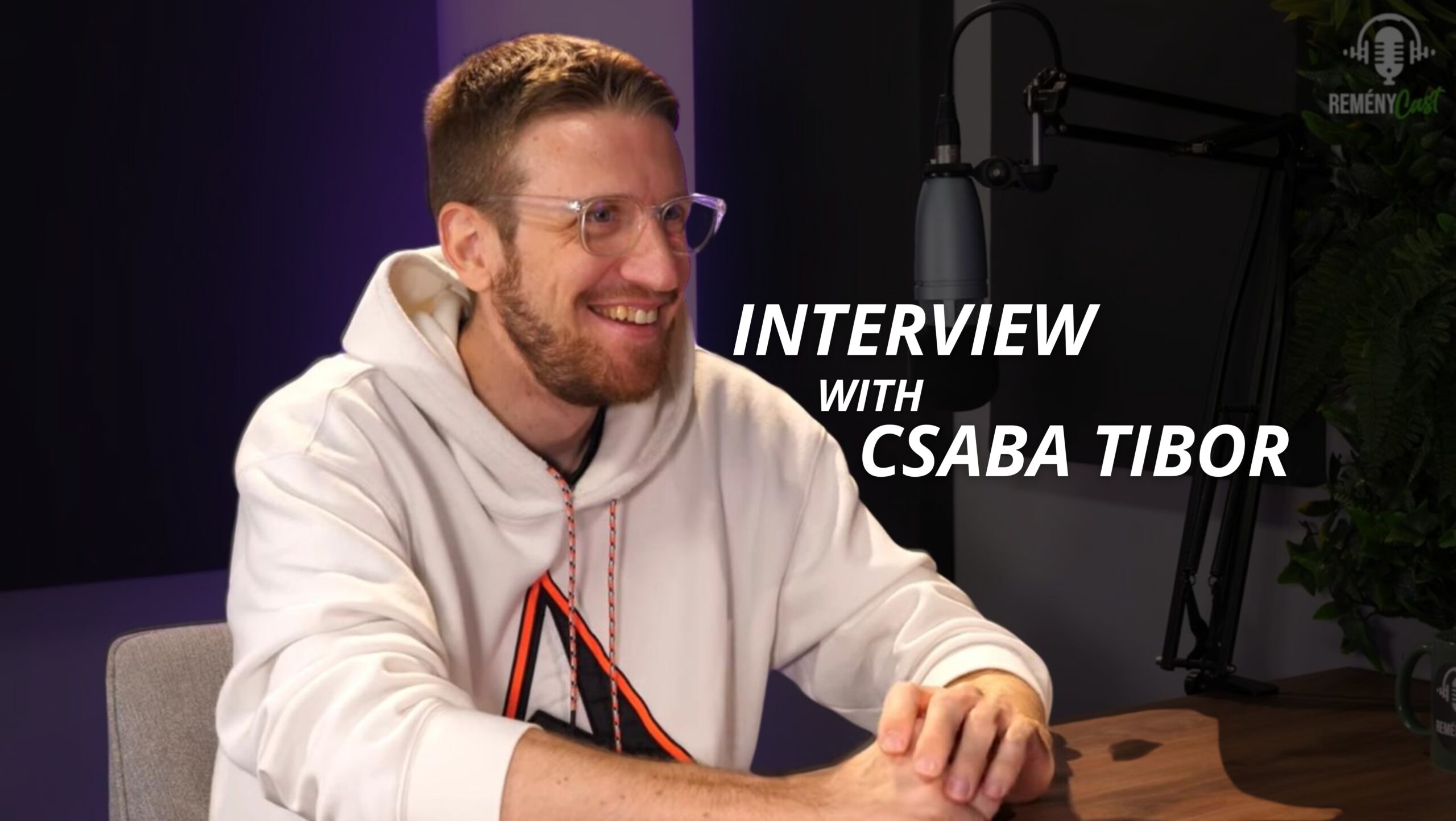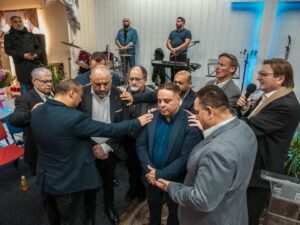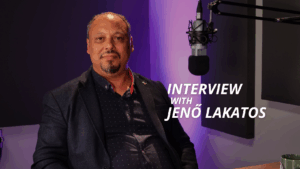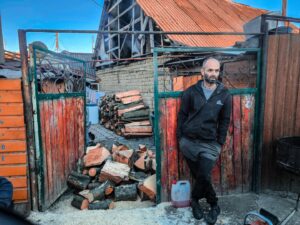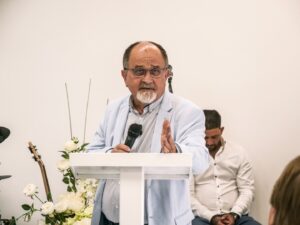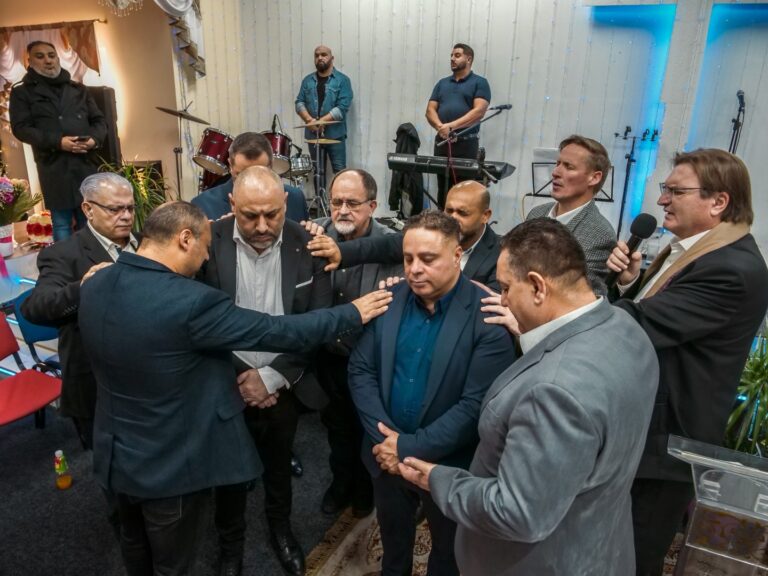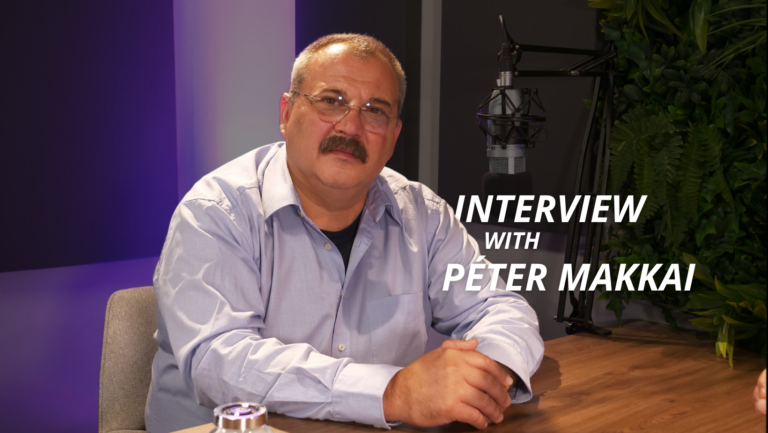In the Hungarian music scene, few dare to share their faith as openly as Csaba Tibor, known artistically as Tibes. As the country’s only Christian rapper, he represents God’s message not only in his lyrics but throughout his entire life. His songs carry honest, sometimes harsh messages that speak boldly to those open to hope but do not shy away from confronting doubters. In this interview, we learn how Tibes’ faith was shaped by his conversion, the challenges he faces as a Christian artist, and the inspirations he draws from in his daily life. We discuss the unique divine gifts within the Roma community, the distinctive power of rap culture, and how he envisions the future in this ever-changing world.
I’ve read a lot about you, and I see many parallels between you and the children here. Where did you come from? Tell us a little about yourself.
Thank you for inviting me, and greetings to the audience! I’ve lived in many places in my life. I started in Kiskőrös and later lived in Székesfehérvár, Veszprém, and Csongrád. I’m a small-town guy, but now we live near Budapest because my wife is a native of the city. I grew up in a conservative family—my father was a soldier, and my mother was a teacher, which gave me insight into social issues. My mother found faith when I was about 13 or 14, which caused tension in the family, and Christianity became a taboo subject at home. At the age of 25, after a partying phase, I began asking life’s big questions, and God answered them. Since then, my faith has been an essential part of my life. I often see in rural areas that many children, while not literally orphans, are neglected or end up in institutions. I believe it’s important not only to talk about God’s love but to live it out through actions. That’s why I gladly join initiatives like yours, as your work is crucial in providing these children with the care they need.
Typically, people are driven to seek closeness to God due to some wound or lack of love. Was that the case for you as well?
I wouldn’t say it came from a lack of love. My parents loved me, and I never felt neglected. Instead, what led me to Christ was achieving everything I had wanted as a teenager—I became popular because of rap, received attention, and seemingly had it all. But when I looked in the mirror, I realized I wasn’t a good person. As the temporary pleasures of sin faded, I noticed how everything is fleeting: relationships, careers, even entire life works collapse in an instant. This realization drove me to seek something more lasting. During a conversation at a café, God touched me supernaturally, which ultimately changed my life completely.
How exactly did this happen?
Even then, I was making music and following the hip-hop scene, especially in America. I started listening to Christian rap artists recommended by YouTube and discovered a Hungarian rap group called MLP, who attended the same church where my mother had found faith. This piqued my interest, and through family connections, I met members of MLP. During a café conversation, they explained Jesus’ redemption in a contemporary, relatable way that deeply moved me for the first time. On September 17, 2016, through a supernatural experience, I decided to dedicate my life to God. Since then, He has completely transformed every aspect of my life, for which I am incredibly grateful.
How has your life changed since then? What do you attribute to it?
After I was saved, I experienced radical changes. Overnight, I stopped drinking alcohol, quit smoking, gave up pornography, and even stopped swearing—all thanks to God’s grace. I began reading the Bible regularly, praying, and attending a church in Kecskemét, where I found support. My friends in Budapest also helped me, encouraging me over the phone. I also started Bible school, which greatly helped my growth in faith. Although this caused further tensions within my family, my identity and faith strengthened as I stood firm for the Lord. These changes have improved every area of my life.
Why did you choose rap as your genre, and how has your Christian faith influenced your creations?
I’ve felt a close connection to rap since childhood. As a teenager, around 15 or 16 years old, I began writing lyrics, and this creative process captivated me so much that rap became a part of my daily life. However, between the ages of 18 and 25, my songs were not faith-based. Back then, they revolved around partying and lighter topics, but I can no longer identify with them, so I deleted those songs. From the age of 25, I began creating as a Christian, using rap to convey my message of faith. In Hungary, Christian rap is not a widely accepted genre, so I feel it’s important to contribute to its cultural integration. While Christian worship music is more accepted, rap remains niche in this area. That’s why, besides my music career, I work full-time as a process engineer at a multinational company to support my family. For me, rap is not just artistic self-expression but a tool to share my faith and promote the acceptance of this genre.
Aren’t you afraid that your honest, Christian messages might alienate your audience?
I wouldn’t say I’m afraid of it, though I’m aware that some people might be put off by these messages. This was a conscious decision on my part. When I converted, I saw others presenting their faith messages in metaphorical, artistically brilliant ways, but it was often difficult to clearly understand that these were Christian songs. I, on the other hand, have a different personality—honest and straightforwardly confrontational. I feel that if someone only hears one of my songs in their life, it should unmistakably reflect the presence of Jesus Christ and God in my life. This doesn’t mean all my songs delve into theological depths; some address social issues. But it’s fundamentally important to me that anyone encountering my music knows I’m a Christian. If I can change even one person’s life and bring them closer to God, then all the effort is worth it.
How did you deal with challenges and opposition?
It was never a question for me that God comes first. This foundation helped me navigate attacks and tensions. For example, there were conflicts within my family and friends, but I decided that God is my priority. I didn’t want to force the gospel on anyone but shared what happened to me while maintaining my usual connections. However, many of my friends distanced themselves after my conversion. This was painful but also a good measure of who truly cared about me. The relationships that ended were likely not deep enough. It was crucial to emotionally detach from these ties so I could focus on God. During the initial period, this was especially difficult, but being physically distant from my old circles helped, as they couldn’t manipulate or pull me back into my old lifestyle. My steadfast faith helped me get through those times.
You are a father. This is an important issue, the direction you are guiding your children in. Is your wife also a Christian?
Yes, my wife is also a Christian. We met when I was a young believer, and I prayed for six months to clearly see if our relationship was in line with God’s will. I approached her differently than I would have in my past life, and I reached out to her through a youth pastor. After a two-year period of getting to know each other and being engaged, we got married. Before the wedding, we made every effort to live our relationship in purity. For example, we waited until our wedding day to share our first kiss, which was very important for both of us.
Why was it important to wait for your first kiss?
We decided to wait until our wedding day for our first kiss because, according to the teachings of the Bible, if someone looks at another person with lustful intent, they have already committed adultery in their heart. I personally experienced that kissing stirred up sexual desire within me, and I didn’t want this to begin before marriage. At the beginning of our relationship, we tried to establish healthy boundaries so that we would not become consumed by physical desires but would instead prioritize the emotional and spiritual aspects of our relationship. This was important not only for my wife but also for me, as I knew that sexual tension can often hide real problems in a relationship. We applied this principle by avoiding physical intimacy that could serve as a substitute for solving emotional issues. Instead, we focused on communication and mutual understanding to strengthen our relationship. Our goal was to build a relationship based on purity and honesty, ensuring that our bond was guided by emotional attachment and shared values, rather than physical desires.
As a father, how do you see your greatest responsibility?
As a parent, my greatest responsibility lies in spending quality time with my children and giving them love, especially while they’re very young. The principle I try to follow is to raise them like the father in the parable of the prodigal son: to give them a foundation and send them off but always welcome them back with love, no matter what happens. Of course, the details are still uncertain, as there’s no one-size-fits-all solution, but my goal is to support them with love and understanding and help them become balanced, happy individuals.
Why do you think there’s a negative perception of Christians in Hungary?
This is a complex question. One reason lies in historical events—things like the Inquisition, the Crusades, and the sale of indulgences have all contributed to the negative image associated with Christianity. The historical events taught in schools and the darker chapters of Catholicism have played a role in shaping this perception. Furthermore, although there have been waves of reform and the emergence of new denominations, there are always hypocritical individuals who preach faith but don’t follow their teachings, further tarnishing the image of Christians.
Such scandals—when church figures commit sins like adultery or sexual abuse—receive significant attention, and the fact that these incidents are often covered up before coming to light only worsens the public perception of Christian communities. The blending of political and religious issues is also a problem. The state’s support for Christianity often confuses people, making it unclear where political Christianity ends and genuine religious faith begins.
In public opinion, Christianity carries negative connotations because many cannot distinguish between religion and political ideologies and don’t find what they see to be authentic. Among today’s youth, the influence of media is greater than that of religious circles, and Christianity often fails to present itself as a positive example. Many hesitate to step forward and represent their faith because they fear social judgment or being labeled as “celebrities.” However, if we don’t produce authentic, valuable content in the media—on platforms like TikTok or YouTube—it will be hard to change this negative image.
What motivates you to speak out on TikTok and represent Christian values?
My primary goal is to reach young people because they consume the most content. People often accept subjective opinions as truth from dominant media platforms, and since current public content creators don’t necessarily represent Christian or conservative values, I want Christian values to have a presence there too. My aim is to communicate a balanced, Bible-based perspective, especially in relation to everyday events, while striving to speak with love and truth.
What message would you share with those who dismiss Christianity as a hoax?
The foundation of Christianity is the death and resurrection of Jesus Christ, which promises forgiveness and eternal life. The first Christians gave their lives to spread this message around the world, and if someone is willing to die for such a cause, it can’t simply be called a hoax. Christianity is not about power or money—it’s about love and self-sacrifice. True Christians act not to gain personal benefits but to save others for eternal life. This love must be visible to society, showing that we Christians truly act out of selfless love and not for material or political gain. If someone gives their life for this cause, it cannot simply be a fabrication—such commitment is possible only when one is entirely convinced of the truth.
How would you respond to those who question the historical existence of Jesus Christ?
If we examine historical evidence, we can see that Jesus Christ’s existence is well-documented. The manuscripts of the Gospels are remarkably close to the events they describe, and the large number of surviving copies strengthens their authenticity. Moreover, Jesus is mentioned not only by Christian authors but also by other contemporary writers, further confirming that He truly lived. The fact that several authors independently describe His resurrection is remarkable from a historical standpoint.
You recently attended a youth event where you met Roma children. What was the atmosphere like, and how did you feel?
It was fantastic! Even though not everyone knew me beforehand, by the first song, the kids were already dancing at the front of the stage. From the applause and their reactions, I could tell they enjoyed it. I used some hip-hop elements, like having them shout responses, which they loved. I handed out a few CDs, which also added to the excitement. Overall, it was a wonderful experience in Békés.
Did you know what to expect before arriving? Are you familiar with this mission and institution?
I knew the basic details but not in-depth. Alex, a school pastor actively involved in the mission, told me about it. There are multiple schools, and the mission is even active abroad—it’s an extensive initiative. From the size of the property and the number of staff, it’s clear that this is a significant and beautiful endeavor.
Our mission serves the Roma community. Do your songs carry messages for them, and what do you see as valuable in their community?
I believe there’s incredible value in the Roma community, particularly their musical talent, which is awe-inspiring, but they excel in other areas as well. I think it’s essential to bring the gospel to them and support them in their upbringing and family background so they can break out of difficult circumstances. I’ve served in Roma communities several times, and they always welcomed me with immense love, which reinforces my belief that they are a valuable part of our society and deserve our help and support.
The Roma mission is extraordinarily significant because it truly transforms lives. When a church embraces, supports, and sets an example for them, it opens up tremendous opportunities that can transform not just individuals but entire communities.



